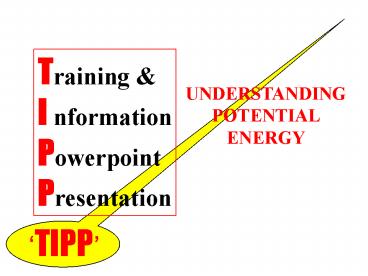Training - PowerPoint PPT Presentation
1 / 14
Title: Training
1
Training I nformation Powerpoint Presentation
UNDERSTANDING POTENTIAL ENERGY
2
- ENERGY
- Energy comes in many different forms
- All of them can be hazardous
- They can often be easy to identify and guard
against e.g. - Mechanical (moving equipment or machinery)
- Install barriers or guards
- Electrical
- Isolate
- Chemical (powders, liquids etc.)
- Wear PPE
3
- ENERGY
- Some forms of energy are less obvious and harder
to identify
- Pressure
- Test equipment, procedures etc.
- Radiation
- Detectors, isolate, procedures etc.
- Chemical (gases)
- Detectors, wear PPE, install ventilation etc.
4
- ENERGY CHANGES
- Energy can change from one form to another.
- Try these
Pressure to Sound
Striking a match
Chemical to Heat Light
Blowing a whistle
Chemical to Sound, Mechanical Kinetic
Turning on electric oven
Driving a car
Electrical to Heat
5
- POTENTIAL ENERGY
- Energy can also be stored in one form for release
in another. e.g. - A battery contains stored energy in a chemical
form and it releases it as an electrical form. - Discuss a metal spring, a hydro-electric dam
- This form of stored energy is called POTENTIAL
energy. - We need to understand it and be fully aware of
all POTENTIAL energy sources in our workplace.
6
- POTENTIAL ENERGY
- Similar to a battery, Potential is a form of
stored energy. - This stored or sometimes trapped energy can occur
accidentally or without those involved realising
it. We then have a highly hazardous situation! - The energy will remain latent (stored) until a
change occurs that causes the energy to be
released. - In certain circumstances, once released the
forces produced by this stored energy can be
large and potentially lethal.
7
- POTENTIAL ENERGY
- Lets look at some examples of Potential energy
You put a tin of soup up on a shelf. By doing
this you have used your energy to pick up and
raise the tin to its new height. You have
therefore given it potential energy that will
remain stored until a change occurs.
The change may be vibration or someone giving it
more energy by accidentally knocking it off the
shelf. The result is obvious the tin releases
its potential energy in the form of kinetic
energy and so on.
8
- POTENTIAL ENERGY
- Heres another simple example
You grip a rubber band between your teeth and
stretch it. By doing this you again transferred
your energy. You have therefore given the rubber
band potential energy that will remain stored
until a change occurs.
In this example, you let go of one end of the
band and The result is obvious SNAP!the band
releases its potential energy in the form of
kinetic energy (and of course a chemical
reaction on your nose!).
9
- POTENTIAL ENERGY
- REMEMBER!As we stated earlier, it is essential
that you are aware of the Potential Energy
Hazards in your work area. Never forget that we
are continually creating them as you lift and
lower materials all over the rig.
Potential energy can be created very slowly or in
an instant. Its release can be catastrophic
causing enormous risk to life and
equipment. Please now take a few moments to
discuss this topic. Here are some pointers to
assist you
10
- POTENTIAL ENERGY
- For each of the following examples
- Take a few moments to draw a simple sketch on a
flipchart. - Consider what forces went into creating the
stored or trapped energy. - Try and identify how the potential energy is
being stored. - Determine how it could be released safely.
- Discuss in detail what could happen if the stored
or trapped energy is not detected and is released
in an unsafe manner. - Identify and discuss any necessary controls to
avoid injury to personnel or damage to equipment.
- Please dont be tempted to rush through them all
save some for another occasion if necessary.
11
- POTENTIAL ENERGY
- Examples of stored or trapped energy
- A restraining component (chain/clamp) failing on
a hydraulic lever e.g. Link-tilt mechanism on a
Top Drive. - A stuck drill string parting while jarring.
- A stand hanging up on the shoulder in rotary and
bending due to weight from above (e.g. travelling
block assembly or top drive unit). - Retrieving a dropped stand from across the
derrick using the air winch. - Pulling a seat from the Mud Pump fluid end
module.
12
- POTENTIAL ENERGY
- Examples of stored or trapped energy (cont.)
- A joint of drill pipe hanging up on cat-walk
while being lowered from drill floor. - A break-out line failing while breaking out drill
collars. - Pipe-work flanges being dismantled
- Flexi-hoses / mud-lines being bent or
disconnected etc. - The air winch line hanging up while lowering or
pulling. (also consider this happening during
man-riding operations) - Can you think of any
more?
13
- POTENTIAL ENERGY
- If you are not already doing so, please give this
topic the attention it deserves during all TRICs
and pre-phase / shift meetings. - POTENTIAL ENERGY HAS THE POTENTIAL TO HARM YOU
AND YOUR COLLEAGUES. - THINK ABOUT IT NOW BEFORE IT GETS THE CHANCE!
14
Training I nformation Powerpoint Presentation
Thank you for your attention!































